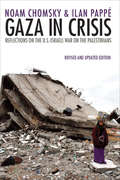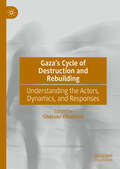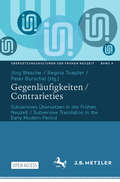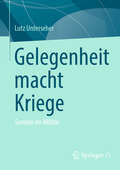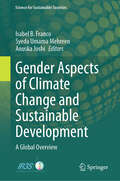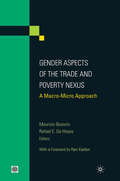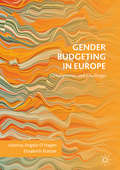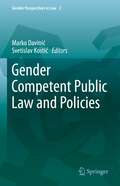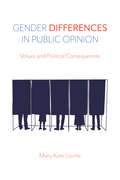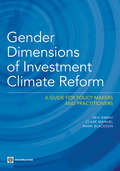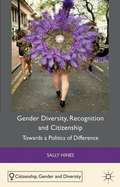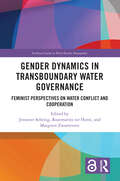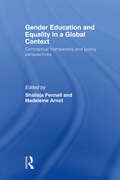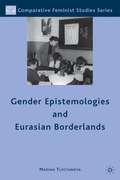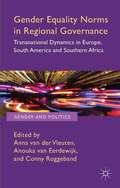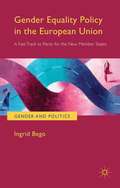- Table View
- List View
Gaza in Crisis: Reflections on the U.S.-Israeli War on the Palestinians
by Noam Chomsky Ilan PappéDescribed by a UN fact finding mission as "a deliberately disproportionate attack designed to punish, humiliate and terrorize a civilian population," Israel's Operation Cast Lead thrust the humanitarian crisis in the Gaza Strip into the center of the debate about the Israel/Palestine conflict. Chomsky and Pappé survey the fallout from Israel's conduct in Gaza and place it in historical context.
Gaza: An Inquest into Its Martyrdom
by Norman G. FinkelsteinThe Gaza Strip is among the most densely populated places in the world. More than two-thirds of its inhabitants are refugees, and more than half are under eighteen years of age. Since 2004, Israel has launched eight devastating “operations” against Gaza’s largely defenseless population. Thousands have perished, and tens of thousands have been left homeless. In the meantime, Israel has subjected Gaza to a merciless illegal blockade. What has befallen Gaza is a man-made humanitarian disaster. Based on scores of human rights reports, Norman G. Finkelstein's new book presents a meticulously researched inquest into Gaza’s martyrdom. He shows that although Israel has justified its assaults in the name of self-defense, in fact these actions constituted flagrant violations of international law. But Finkelstein also documents that the guardians of international law—from Amnesty International and Human Rights Watch to the UN Human Rights Council—ultimately failed Gaza. One of his most disturbing conclusions is that, after Judge Richard Goldstone's humiliating retraction of his UN report, human rights organizations succumbed to the Israeli juggernaut. Finkelstein’s magnum opus is both a monument to Gaza’s martyrs and an act of resistance against the forgetfulness of history.
Gaza’s Cycle of Destruction and Rebuilding: Understanding the Actors, Dynamics, and Responses
by Ghassan ElkahloutGaza’s Cycle of Destruction: Understanding the Actors, Dynamics, and Responses is an integrated, multidisciplinary, and comprehensive academic inquiry into Gaza wars and their drivers, actors, dynamic, paradigms, and responses. Unlike studies on the previous wars in Gaza, it seeks to present to the regional and global readership a different perspective towards the conflict—one that is authored by nearly a dozen Palestinian researchers and academics. It strives to steer away from the ‘Northern’-dominated research space to present an informative, analytical, and thought-provoking argument. The book provides a combination of theoretical, thematic, and topical analysis of the war. It is designed to guide the reader through the background and development of the events of the 2023 war. Put differently, the book’s objective goes beyond tracing the historical roots of instability in Gaza. Instead, it directly addresses the Gaza Strip’s contemporary context.
Geflüchtete in ländlichen Regionen Deutschlands (Studien zur Migrations- und Integrationspolitik)
by Birgit Glorius Johanna Fick Peter Mehl Stefan Kordel Hannes SchammannDie Open-Access-Publikation präsentiert umfangreiche empirische Analysen zu Halte- und Bleibeorientierung Geflüchteter und richtet den Blick dabei besonders auf die Situation der ländlichen Regionen Deutschlands. Migrations- und Integrationsforschung in Deutschland war bislang überwiegend auf Großstädte ausgerichtet. Durch den vermehrten Zuzug geflüchteter Menschen seit 2014 sehen sich jedoch auch Kleinstädte und Dörfer in ländlichen Regionen verstärkt mit Aufgaben der Aufnahme und Integration von Geflüchteten konfrontiert. Ziel dieses Buches ist es, empirisch fundiert zu beantworten, unter welchen Voraussetzungen und wie humanitäres Engagement und ländliche Entwicklung erfolgreich verbunden werden können und wie dies von Politik und Zivilgesellschaft positiv beeinflusst werden kann.
Gefährliche Nähe [German-language Edition]: Salafismus und Dschihadismus in Deutschland
by Klaus Hummel Michail LogvinovThis collection examines current, virulent Salafism and jihadism phenomena. Many claim that either Islam and violence or religion and terror go hand in hand. The contributors to this volume disrupt this claim, using social science methods to determine whether and under what conditions such a dangerous proximity evolves. The volume reveals which actors extremists target and introduces innovative analytical methods, including a process of coradicalization and an attitude-based approach to the study of Salafist networks.Salafism and jihadism are an important focus of inner-German security discussions. The Salafi proselytizing is more successful than ever, and the jihad in Afghanistan or Syria pulls Islamists from Germany.This collection offers an examination of currently virulent phenomena of Salafism and jihadism from different perspectives. It is sometimes claimed that either Islam and violence or religion and terror go hand in hand; the authors of this volume aim to show that this is not so. Using the methods of social science to determine whether and under what conditions such a dangerous proximity comes about, this book offers insight into which actors are being looked for by extremists to exploit and to use as self-fulfilling prophecies.To this end, the authors develop innovative analytical concepts: Among other things, a process of co-radicalization and an attitude-based approach to the study of Salafist networks are described.The book makes an important contribution to the current debate by not presenting the potentially dangerous proximity of Islam and violence as a social fact, but describes it as a factor that can be influenced and understood.Salafismus und Dschihadismus stehen im Mittelpunkt innerdeutscher Sicherheitsdiskussionen. Die salafistische Missionierung ist erfolgreich wie nie zuvor, und der Dschihad in Afghanistan oder Syrien zieht die Islamisten aus Deutschland an. Der vorliegende Sammelband beleuchtet aus unterschiedlichen Perspektiven die derzeit virulenten Phänomene des Salafismus und Dschihadismus. Weder soll damit plakativ eine Nähe von Islam und Gewalt, Religion und Terror behauptet noch eine solche pauschal geleugnet werden. Vielmehr wird mit sozialwissenschaftlichen Methoden erklärt, ob und unter welchen Bedingungen eine solche gefährliche Nähe zustande kommt, welche Akteure sie suchen, instrumentalisieren oder sie zur sich selbst erfüllenden Prophezeiung werden lassen. Zu diesem Zweck entwickeln die Autoren innovative Analysekonzepte: Unter anderem werden ein Prozess der Co-Radikalisierung und ein attitüdenbasierter Ansatz zur Untersuchung salafistischer Netzwerke beschrieben.Der Band leistet einen wichtigen Beitrag zur aktuellen Diskussion, indem er die gefährliche potentielle Nähe von Islam und Gewalt nicht etwa als soziales Faktum präsentiert, sondern als beeinflussbare Größe beschreibt und verständlich macht.
Gefühlte Zukunft: Emotionen als methodische Herausforderung für die Zukunftsforschung (Zukunft und Forschung)
by Axel Zweck Karlheinz Steinmüller Katharina SchäferWelche Rolle spielen Emotionen bei der Konstruktion, Kommunikation und Nutzung von Zukunftsbildern? Sind Emotionen primär eine Komponente, die Vorurteile transportiert? In welchem Maße sind Forschende selbst Emotionen ausgesetzt, die die Methodenwahl und die Ergebnisse beeinflussen? In dem Sammelband kommt die gesamte Breite der Thematik „Zukunftsforschung und Emotionalität“ zur Sprache, von den philosophischen Grundlagen bis zu methodischen Fragestellungen und Erkenntnissen aus der Praxis, die die enge Verschränkung von Kognition und Emotion in allen Phasen von Vorausschauprozessen belegen.
Gegenläufigkeiten / Contrarieties: Subversives Übersetzen in der Frühen Neuzeit / Subversive Translation in the Early Modern Period (Übersetzungskulturen der Frühen Neuzeit #4)
by Regina Toepfer Peter Burschel Jörg WescheTranslation und Subversion: Wie hängt beides zusammen? Das ist die Leitfrage dieses Sammelbands, der methodische Orientierungen und historische Studien zur Frühen Neuzeit in unterschiedlichen geographischen Settings und interlingualen Konstellationen vom 16. bis zum 18. Jahrhundert bietet. Translationswissenschaft, Romanistik, Japanologie, Germanistik und Musikwissenschaft sind die Disziplinen, die der Band zusammenbringt, um die besonders für frühneuzeitliche Übersetzungskulturen wenig gesehenen Gegenläufigkeiten in den Blick zu nehmen und auf subversive Übersetzung als Katalysator interkultureller Widerständigkeit, aber auch Unterwanderung scharfzustellen. Translation and subversion: how are the two related? That is the question pursued by this compilation of methodological orientations and historical studies on the Early Modern period in various geographical settings and interlingual constellations from the sixteenth to the eighteenth centuries. Bringing together a broad range of disciplines – translation studies, Romance studies, Japanology, German studies, and musicology – the volume takes a closer look at contrarieties hitherto little noticed, especially with regard to Early Modern translation cultures. In the process it focuses on subversive translation as a catalyst for intercultural resistivity as well as subversive action. Dies ist ein Open Access-Buch / This is an open access book.
Gegenwart und Zukunft des Sozialmanagements und der Sozialwirtschaft: Aktuelle Herausforderungen, Strategische Ansätze Und Fachliche Perspektiven
by Waltraud Grillitsch Paul Brandl Stephanie SchullerDas Buch analysiert, wie sich Sozialmanagement/Sozialwirtschaft disziplinär verorten und sich anstehenden Entwicklungsaufgaben widmen können. Die diskursive Annäherung an aktuelle Herausforderungen, Entwicklung innovativer theoretischer und praktischer Ansätze, Methoden und Konzepte künftiger Entwicklungsplanung und sozialmanagementorientierter Steuerung erfolgt durch Beiträge von ca. 30 FachautorInnen.
Gegenwart und Zukunft sozialer Dienstleistungsarbeit: Chancen und Risiken der Digitalisierung in der Sozialwirtschaft (Perspektiven Sozialwirtschaft und Sozialmanagement)
by Arne Manzeschke Carolin Freier Joachim König Barbara Städtler-MachDer Band skizziert und diskutiert den digitalen Wandel in der Sozialwirtschaft. Internationale Beiträge aus der Praxis und Wissenschaft Sozialer Arbeit sowie dem Gesundheits- und Pflegebereich beschreiben, wie digitale Technologien den Alltag von Beschäftigten und deren Klient*innen prägen (werden). Enorme Chancen und gleichzeitig erhebliche Risiken dieses Wandels werden dabei debattiert, etwa mit Blick auf die Arbeitswelten, Professionen, soziale Teilhabe und daraus abzuleitende ethische Implikationen.Den Leser*innen bieten sich Praxiseinblicke, wissenschaftliche Analysen, Handlungsempfehlungen und Reflexionspotentiale, um soziale Dienstleistungsarbeit im Heute und Morgen (mit) zu gestalten.
Gelegenheit macht Kriege: Sonden im Militär
by Lutz UnterseherGeleitet von einer verbreiteten Vermutung wird danach gefragt, ob die relative Schwäche eines Gegners oder die Wahrnehmung besonderer Verwundbarkeit des jeweiligen Kontrahenten, also von günstigen Gelegenheiten für einen Angriff, tatsächlich den Ausbruch von offenen Feindseligkeiten wahrscheinlicher macht.
Gemeinwohlorientiert, ökologisch, sozial: Aushandlungen um alternative Wirtschaftspraktiken in der Zivilgesellschaft (Bürgergesellschaft und Demokratie)
by Cornelia KühnDer Klimawandel gefährdet die Existenzgrundlage zukünftiger Generationen. Damit zukunftsfähige und klimaverträgliche Gesellschaften entstehen können, sind tiefgreifende Änderungen von Produktionsprozessen, aber auch von Konsummustern und Lebensstilen notwendig. In diesem Sammelband werden Möglichkeiten und Grenzen der Ausweitung alternativer Wirtschafts- und Lebensformen erkundet. Dabei werden kleine Unternehmen und nachhaltige Bildungsinitiativen genauso betrachtet wie Regionen, Berufszweige und Großunternehmen auf ihrem Weg in eine nachhaltige Zukunft.
Gender And Class In English Asylums, 1890–1914
by Louise HideAn unprecedented number of people were sent to 'lunatic asylums' in the nineteenth century. But what was life like inside? How was order maintained? And why were so many doctors on the verge of a breakdown themselves? This book provides a glimpse into the lives of patients and staff inside two London asylums at the turn of the twentieth century.
Gender And Welfare States In East Asia
by Sirin Sung Gillian PascallContributors address questions about gender equality in a Confucian context across a wide and varied social policy landscape, from Korea and Taiwan, where Confucian culture is deeply embedded, through China, with its transformations from Confucianism to communism and back, to the mixed cultural environments of Hong Kong and Japan.
Gender Aspects of Climate Change and Sustainable Development: A Global Overview (Science for Sustainable Societies)
by Isabel B. Franco Syeda Umama Mehreen Anuska JoshiThis book addresses how sustainability discourse and advocacy can translate to impactful policies especially when bridging the divide between sustainability, climate change and gender. The book explores various areas, such as conservation, climate action, sustainable fashion, and corporate sustainability, and defines the existing sustainability gaps in the selected cases (country/sector/region). It highlights the value of sustainability science and climate change on innovative approaches to research, education, capacity-building, and practice to transform rhetoric into impact sustainability while encompassing cases from various industries, sectors, and geographical contexts. While emphasizing SDG 5, the book chapters also show the transboundary implications of gender equality and inclusivity to other sustainable development and climate change goals and targets. The contributions are exemplary in highlighting the relation of gender inclusivity in strengthening efforts to protect andsafeguard the world’s cultural and natural heritage and making cities and human settlements inclusive and safe (Goal 11), protecting, restoring, and promoting sustainable management of terrestrial ecosystems and reverse land degradation (Goal 15), ensuring access to affordable, reliable, sustainable and modern energy for all (Goal 7), promoting sustainable and inclusive economic growth with productive and decent employment for all (Goal 8), promoting inclusive and sustainable industrialization (Goal 9), adopt policies to reduce inequalities (Goal 10), ensure sustainable consumption and production pattern (Goal 12), addressing climate change impacts and building resilience (Goal 13), and ensuring availability and sustainable management of water and sanitation for all (Goal 6).
Gender Aspects of the Trade and Poverty Nexus
by Maurizio Bussolo Rafael E. De Hoyos Ravi KanburTrade liberalization can create economic opportunities for poor people. But are these opportunities available to men and women equally? Do the gender disparities in access to education, health, credit, and other resources limit the gains from trade and the potential benefits to poor women? This volume introduces the gender dimension into empirical analyses of the links between trade and poverty, which can improve policy making. The collection of chapters in this book is close to an ideal macro-micro evaluation technique that explicitly assesses the importance of gender in determining the poverty effects of trade shocks. Part I, relying on ex ante simulation approaches, focuses on the macroeconomic links between trade and gender, where labor market structure and its functioning play a key role. Part II concentrates on micro models of households and attempts to identify the ex post effects of trade shocks on household income levels and consumption choices. It also addresses questions about possible changes in inequality within households due to improved economic opportunities for women. 'Gender Aspects of the Trade and Poverty Nexus' will be invaluable to policy makers, development practitioners and researchers, journalists, and students.
Gender Budgeting in Europe: Developments And Progress
by Angela O'Hagan Elisabeth KlatzerThis book takes a broad look at conceptual and practical applications of gender budgeting in Europe. It comprises three linked sections that work through conceptual definitions of gender budget analysis. These sections explore how it can be framed and constructed as a gender equality policy; investigate case studies across Europe; and examine challenges for implementation. The first book of its kind, Gender Budgeting in Europe explores conceptual and methodological variations evidence in practice in Europe and the challenges of adoption and implementation in different political and institutional contexts. It brings together historical and current conceptual developments and tensions; approaches, methodologies, and tools in practice across Europe; activism, actors and agency and the engagement of formal institutions at all levels of government with feminist policy changes and feminist analysis and activists. This text is fascinating reading for students, scholars, policy makers and activists.
Gender Competent Public Law and Policies (Gender Perspectives in Law #2)
by Marko Davinić Svetislav KostićThis book offers a new perspective on public law and public policies. The collection of papers gathered here begins with an in-depth discussion on gender perspectives in constitutional law, which can support gender justice, but also perpetuate patriarchal norms. The book then analyzes the role of the European Ombudsman in the area of gender discrimination. Despite its limited jurisdiction, this institution has become a significant complementary tool in the protection of gender equality and the elimination of gender discrimination at the EU level. Particular attention is paid to the importance of mainstreaming gender into public policies. Thus, the legal and institutional frameworks of Spain and Serbia are presented, which can serve as an inspiration to other countries. Another important aspect covered in the book is an analysis of systemic differences between the average wages of women and men in the six countries of the Western Balkans. In turn, the book presents a discussion on female genital mutilation as a highly gendered crime based on extreme versions of rigid, patriarchal ethnic and religious norms and customs. It is analyzed through the lenses of the Istanbul Convention, as a tool for combating violence against women. Particular attention is paid to femicide, its definitions, forms, and phenomenological characteristics. Having been only recently acknowledged, femicide is still characterized by an inadequate judicial response in many countries. In this regard, a special focus is on German and Serbian experiences in acknowledging femicide and combating it through various measures. Finally, the importance of stalking laws is discussed, as stalking is a highly gendered crime that many states fail to combat adequately. The collection of essays offered in this book will be of interest to all those working in the field of public law, to policymakers, and to students and academics looking to broaden and deepen their research on various issues in public law and policies from gender perspectives.
Gender Differences in Public Opinion: Values and Political Consequences
by Mary-Kate LizotteIn this era in which more women are running for public office—and when there is increased activism among women—understanding gender differences on political issues has become critical. In her cogent study, Mary-Kate Lizotte argues that assessing the gender gap in public support for policies through a values lens provides insight into American politics today. There is ample evidence that men and women differ in their value endorsements—even when taking into account factors such as education, class, race, income, and party identification. In Gender Differences in Public Opinion, Lizotte utilizes nationally representative data, mainly from the American National Election Study, to study these gender gaps, the explanatory power of values, and the political consequences of these differences. She examines the gender differences in several policy areas such as equal rights, gun control, the death penalty, and the environment, as well as social welfare issues. The result is an insightful and revealing study of how men and women vary in their policy positions and political attitudes.
Gender Dimensions of Investment Climate Reform: A Guide for Policy Makers and Practitioners
by Sevi Simavi Clare Manuel C. Mark BlackdenThe economic empowerment of women is increasingly seen as one of the most important forces behind economic growth and the fight against poverty. Indeed, women's economic participation in an economy as entrepreneurs, employees, and leaders is recognized as a measure of a country's dynamism and viability. 'Gender Dimensions of Investment Climate Reform' provides fresh solutions to common issues that women entrepreneurs face. It presents actionable, replicable, and scalable tools for promoting gender-sensitive investment climate reforms that would benefit both women and men. The book enables development practitioners and policy makers who are not gender specialists to diagnose gender issues in an investment climate; design creative and practical solutions and recommendations for addressing gender constraints; and monitor and evaluate the implementation of those recommendations.
Gender Diversity, Recognition and Citizenship
by Sally HinesThis book examines the meanings and significance of the UK Gender Recognition Act within the context of broader social, cultural, legal, political, theoretical and policy shifts concerning gender and sexual diversity, and addresses current debates about equality and diversity, citizenship and recognition across a range of disciplines.
Gender Dynamics in Transboundary Water Governance: Feminist Perspectives on Water Conflict and Cooperation (Earthscan Studies in Water Resource Management)
by Jenniver Sehring Rozemarijn ter Horst and Margreet ZwarteveenThis volume assesses the nexus of gender and transboundary water governance, containing empirical case studies, discourse analyses, practitioners’ accounts, and theoretical reflections. Transboundary water governance exists at the intersection of two highly masculinised fields: diplomacy and water resources management. In both fields, positions are mainly held by men, and core ideas, norms, and guiding principles that are presented as neutral, are both shaped by men and based on male experiences. This book sheds light on the often hidden gender dynamics of water conflict and cooperation at the transboundary level and on the implicit assumptions that guide research and policies. The individual chapters of the book, based on case studies from around the world, reveal the gendered nature of water diplomacy, take stock of the number of women involved in organisations that govern shared waters, and analyse programmes that have been set up to promote women in water diplomacy and the obstacles that they face. They explore and contest leading narratives and knowledge that have been shaped mainly by privileged men, and assess how the participation of women concretely impacts the practices, routines, and processes of water negotiations. This volume will be of great interest to students and scholars of water governance, water diplomacy, gender, international relations and environmental politics. It will also be of interest to professionals and policymakers involved in supporting gender mainstreaming in water cooperation.
Gender Education and Equality in a Global Context: Conceptual Frameworks and Policy Perspectives
by Shailaja Fennell Madeleine ArnotThe Millennium Development Goals aim to achieve basic education for all by 2015. But can such global agendas address national and local gender inequalities and will they empower women through education? This thought-provoking book offers an opportunity to engage critically with existing and emergent conceptual frameworks and methodological approaches to this global debate. It is divided into three sections that: reconceptualise the definitions of gender equality used by various social scientific disciplines, international organisations and policy makers; illustrate the methodologies used to collect the voices of young men and women and their teachers telling stories of their success in lifting the burdens of poverty and negotiating traditional gender relations; trace the impact of global gender agendas on national education policies, such as citizenship education, poverty reduction strategies, and feminist activism around adult women’s learning. Gender Education and Equality in a Global Context is an invaluable introduction to the range of conceptual frameworks and innovative research methods that address issues of gender education and development.
Gender Epistemologies and Eurasian Borderlands
by Madina TlostanovaTlostanova examines Central Asia and the Caucasus to trace the genealogy of feminism in those regions following the dissolution of the USSR. The forms it takes resist interpretation through the lenses of Western feminist theory and woman of color feminism, hence Eurasian borderland feminism must chart a third path.
Gender Equality Norms In Regional Governance
by Anna Van Der Vleuten Anouka Van Eerdewijk Conny RoggebandThis book analyses the diffusion of norms concerning gender-based violence and gender mainstreaming of aid and trade between the EU, South America and Southern Africa. Norm diffusion is conceptualized as a truly multidirectional and polycentric process, shaped by regional governance and resulting in new geometries of transnational activism.
Gender Equality Policy in the European Union
by Ingrid BegoThis book examines the role that the European Union (EU) has played in enhancing democratic values in new member states by requiring the adoption of gender equality laws, such as equal employment and reconciliation policies, in return for membership. Considering four EU member states in Central Eastern Europe - Bulgaria, Czech Republic, Latvia and Poland - it debates if and under what conditions the incentives for EU membership positively affected the successful adoption and implementation of gender equality policies. The book looks at the role of formal and informal domestic institutions to understand successful alliances in each case study, and considers the dynamic relationship between domestic and international actors in the context of global governance. Engaging with the study of public policy, this book discusses how the EU is capable of successful promotion of human rights and democratic values in general and provides insight on how any supranational organization can establish effective incentive structures to produce desired outcomes.
